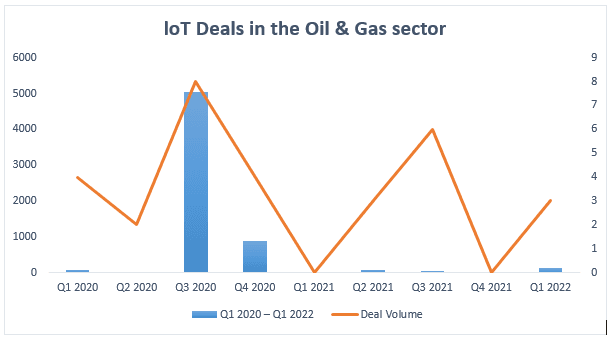Iot In Oil & Gas
The IoT in Oil & Gas Industry consist of various tangible objects connected to the internet. Devices, Equipment’s and wearables and thing that can be embedded with software, sensors, and network connectivity. The IoT can bring high-level overview and architecture focus in Oil & Gas Industry. IoT helps in providing smart energy solutions in better field communication, real time monitoring, reduce costs of maintenance, power consumption, provides safety and security of assets, and thus higher productivity.
Advantages of the Iot (Internet of Things)
- Cost efficient
- Efficiency and productivity
- Business opportunities
- Customer experience
- Mobility and agility
IoT has important aspects that helps in scalability and security. Internet of things has various application in Oil & Gas industry such as: –
- Seismic exploration sensors
It is one of the IoT sensor which is connected to fibre optic cables aid oil exploration subsurface drilling site. It helps to determine new drilling location and it also provides efficiency in operational sites. Generally, it collects data in form of pictures of the surface area and transfer to the servers.
- Digital twin for assets
It helps to tracks the potential maintenance issues which helps in optimizing the assets and also increases its life. It helps to improve asset management. These benefits can be expanded. These benefits can be expanded by using a visual- or virtual reality-based digital twin.
- Digital twin for projects
It is digital replica of an actual asset, provides useful insights like outstanding issuers and bottleneck constraints as it provides the platform that enables the organisations companies the ability to drill down virtually. It helps to boost efficiency and it also provides 3D reports. This technology improves project speed and quality.
- Acoustic operations monitoring
This is the one of the important sensors in the Oil and Gas industry it is used to determine oil composition (oil, water, gas, etc.) with in the pipelines. In addition, it also provides statistical models which helps in analysis in composition and flow rates. It helps to improve overall operations and reduce dependencies on expensive equipment’s.
- Sensor-based tank monitoring
It is an important aspect in Oil and Gas industry for which different sensors are used to monitor inventory levels of onshore oil tanks. It automatically dispatches the oil when needed. It also helps in monitoring the performance of ground pump. Real time monitoring system optimizing inventory transportation and minimizing downtime costs.
Offshore Technology’s Internet of Things (IoT) deal tracker in the oil & gas sector monitors deals involving IoT or similar technologies over the past nine quarters.

Conclusion
Internet of Things IoT provides various advantages to oil and gas industry. The Oil and Gas industry are way complicated, and it requires cooperation of many task that has to be performed simultaneously, if any kind of delay in action will exert immense pressure and can have wide scale repercussion. To provide smooth functioning in operation IoT comes handy. This not only helps in providing smooth functioning but also helps to save costs which is an important factor in every organisation. It provides real time data and also provides comprehensive solutions using Augmented Reality and Virtual Reality, etc. IoT is shaping the oil and gas industry, but due to complex technology it also involves high implementation costs.
For more detail Contact:
UnivDatos Market Insights
C80B, Sector-8, Noida,
Uttar Pradesh 201301
For Sales related query, please reach us at[email protected]
